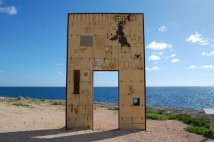The Lampedusa Charter has been written and approved, its English version will be available soon* for subscription.
The work is the result of discussions and debates participated by 250 hundred people, coming from collectives, associations, self-managed and occupied social spaces, movements, from Italy but also from Hamburg, Berlin, Belgium, Portugal, Turkey, Austria, Switzerland and Tunisia.
The Charter doesn't want to be a law nor a petition to Governemnts, but a constituent pact of commitment among those who produced it and will sign it. In this sense the final assembly of the Lampedusa meeting was clear: "we must give life to its chapters by making action against the current policies managing people's movement", said many speakers.
The assembly of the 2nd of february has ended the three-days meeting, questioning the Lampedusa Charter's future perspectives. The morning started with the speech of the women of Lampedusa involved in the daily battle for the access to right to Education and Health in this land of border, where inhabitants themself experience precariety of rights.
After them, a Tunisian representant of “Land for all” brought out the voice of the families of Tunisian citizens died in the Mediterranean sea, he said that these massacres must end forever and borders must be open.
Speeches in the assembly featured a common commitment: to widen up the subscription of the Lampedusa Charter, to make its principles become concrete in local experiences and in European mobilisations too. A first goal is to reach one million of signatures of people and groups sharing the charter principles, starting from two thousands of signatures already received during the meeting and in the following days.
Many interventions highlighted the need to act for the closing down of any detention structures for undocumented migrants, following the Charter recommendations, starting from the contribution that the Italian struggles for the definitive closing down of CIE (Identification and Expulsion Centres) can represent for other EU countries.
In that sense the demonstration for the closing of the CIE of Ponte Galeria in Rome next February the 15th has been presented by Giansandro Merli from Esc Rome.
It is really the time in Italy to close all migrants' detention centres, since struggles of detained migrants and activists have lead to the temporary closing of CIE in the city of Bologna, Gradisca, Milano, Crotone, Modena, Lampedusa and others, which are not to function again.
At the same time Sicilian activists claimed for the abolition of those structures where migrants' dignity is violated, and presented the mobilisation on the 16th of February against the huge
reception centre for asylum seekers (CARA) of Mineo (Catania province), where more than one thousands refugees are kept for eternity without facilities nor future perspectives.
The European dimension of action has been recognised as fundamental for local mobilisations, starting for next initiatives on the First of march, choosing common claims and slogans, as suggested by the delegation of Lampedusa in Hamburg which will held a demonstration on the first of march.
Common mobilisations to be build together in Europe, to contrast EU policies against freedom of circulation, residence rights and inclusion ways inside Europe: this is a central challenge for the future of the Lampedusa Charter.
In this framework stands the proposition of the Refugees march/caravan to Bruxelles on the 25th and 26th of June.
Also the proposition to connect with general European mobilisation promoted by Blockupy network on the week from the 15th to the 22nd of may has been considered by some speakers. This goes in the direction of the purpose of the Charter: not a text to be delivered to Institution asking them to but it into practice, but a tool to inter-act between groups contrasting EU policies against residence and movement rights, with the aim to make struggles wider at the European level.
The spirit shared during the assembly is that the principles written in the Charter have to be brought to life through initiatives, as already happens for instance with organised occupation of houses carried in last weeks in Padova, Rimini, Ancona, Reggio Emilia, or throughout struggles for the right to income, as it is already with the migrants' workers protagonism in the logistic sector, as Manila Ricci from ADL Cobas pointed out.
Many hints and proposals, which confirm the Charter's deal: to be a new tool for political interventions on a European level, for struggles for migrants' rights for sure, but also for struggles for justice, dignity, and rights for a new concept of European citizenship.
Write to: [email protected]
To see all materials collected by Globalproject.info go here
* the translation and editing work is itself a collective grass-roots process carried out by activists and supporters of the Charter

